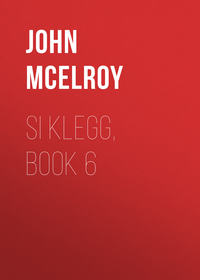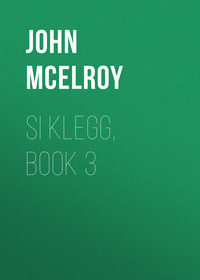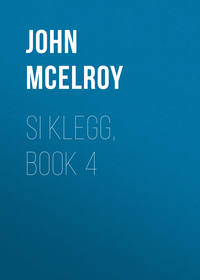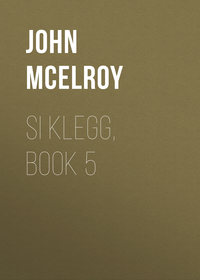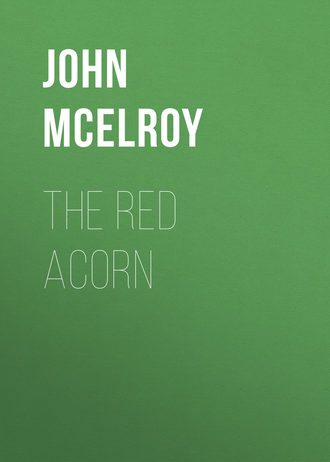 полная версия
полная версияThe Red Acorn
She picked nervously at the engagement ring which Harry had placed upon her finger. It fitted closely, and resisted her efforts at removal. She felt, when it was too late, that neither this nor its significance had escaped Dr. Denslow’s eyes.
“A f-riend—an—acquaintance of mine has disgraced himself,” she said, with a very apparent effort.
An ordinary woman would have broken down in a tearful tempest, but as has been said before she was denied that sweet relief which most women find in a readily responsive gush of tears. Her eyes became very dry and exceedingly hot. Her misery was evident.
The Doctor took her hand with a movement of involuntary sympathy. “I am deeply hurt to see you grieve,” he said, “and I wish that I might say something to alleviate your troubles. Is it anything that you can tell me about?”
“No, it is nothing of which I can say a word to any one,” she answered. “It is a trouble that I can share with no one, and least of all with a stranger.”
“Am I not more than a stranger to you?” he asked.
“O yes, indeed,” she said, and hastening to correct her former coldness, added:
“You are a very dear, good friend, whom I value much more highly than I have given you reason to think.”
His face brightened wonderfully, but he adventured his way slowly. “I am very glad that you esteem me what I have tried to show myself during our acquaintance.”
“You have indeed shown yourself a very true friend. I could not ask for a better one.”
“Then will you not trust me with a share of your sorrows, that I may help you bear them?”
“No, no; you can not. Nobody can do anything in this case but myself.”
“You do not know. You do not know what love can accomplish when it sets itself to work with the ardor belonging to it.”
“Love! O, do not speak to me of that,” she said, suddenly awaking to the drift of his words, and striving to withdraw her hand.
“No, but I must speak of it,” he said with vehemence entirely foreign to his usual half-mocking philosophy. “I must speak of it,” he repeated with deepening tones. “You surely can not be blind to the fact that I love you devotedly—absorbingly. Every day’s intercourse must have shown you something of this, which you could not have mistaken. You must have seen this growing upon me continually, until now I have but few thoughts into which your image does not appear, to brighten and enhance them. Tell me now that hopes, dearer—infinitely dearer—than any I have ever before cherished, are to have the crown of fruition.”
“I can not—I can not,” she sighed.
“What can you not? Can’t you care for me at least a little?”
“I do; I care for you ever so much. I am not only grateful for all that you have been to me and done for me, but I have a feeling that goes beyond mere gratitude. But to say that I return the love you profess for me—that I even entertain any feeling resembling it—I can not, and certainly not at this time.”
“But you certainly do not love any one else?”
“O, I beg of you not to question me.”
“I know I have no right to ask you such a question. I have no right to pry into any matter which you do not choose to reveal to me of your own free will and accord. But as all the mail of the hospital goes through my hands, I could not help noticing that in all the months that you have been here you have written to no man, nor received a letter from one. Upon this I have built my hopes that you were heartfree.”
“I can not talk of this, nor of anything now. I am so wrought up by many things that have happened—by my letter from home; by your unexpected declaration—that my poor brain is in a whirl, and I can not think clearly and connectedly on any subject. Please do not press me any more now.”
The torrent of his passion was stayed by this appeal to his forbearance. He essayed to calm down his impetuous eagerness for a decision of his fate, and said penitently:
“I beg your pardon. I really forgot. I have so long sought an opportunity to speak to you upon this matter, and I have been so often balked at the last moment, that when a seeming chance came I was carried away with it, and in my selfish eagerness for my own happiness, I forgot your distress. Forgive me—do.”
“I have nothing to forgive,” she said frankly, most touched by his tender consideration. “You never allow me an occasion for forgiveness, or to do anything in any way to offset the favors you continually heap upon me.”
“Pay them all a thousand times over by giving me the least reason to hope.”
“I only wish I could—I only wish I dared. But I fear to say anything now. I can not trust myself.”
“But you will at least say something that will give me the basis of a hope,” he persisted.
“Not now—not now,” she said, giving him her hand, which he seized and kissed fervently, and withdrew from the room.
She bolted the door and gave herself up to the most intense thought.
Assignment to duty with an expedition took Dr. Denslow away the next morning, without his being able to see her. When he returned a week later, he found this letter lying on his desk:
MY VERY DEAR FRIEND: The declaration you honored me with making has been the subject of many hours of the most earnest consideration possible. I am certain that it si due to you and to the confession that you have made of your feelings, that I should in turn confess that I am deeply—what shall I say—INTERESTED in you? No; that is too prim and prudish a term. There is in you for me more than a mere attraction; I feel for you something deeper than even warm friendship. That you would make such a husband as I should cherish and honor, of whom I should be proud, and whose strong, kindly arms would be my secure support and protection until death claimed us, I have not the slightest doubt. But when I ask myself whether this is really love—the sacred, all-pervading passion which a woman should feel for the man to whom she gives herself, body and soul, I encounter the strongest doubts. These doubts have no reference to you—only to myself. I feel that it would be a degradation—a deep profanation—for me to give myself to you, without feeling in its entirety such a love as I have attempted to define. I have gone away from you because I want to consider this question and decide it with more calmness and impartiality than I can where I meet you daily, and daily receive some kindness from your hands. These and the magnetism of your presence are temptations which I fear might swerve me from my ideal, and possibly lead to a mistake which we both might ever afterward have reason to regret.
I have, as you will be informed, accepted a detail to one of the hospitals at Nashville. Do not write me, except to tell me of a change in your postoffice address. I will not write you, unless I have something of special moment to tell you. Believe me, whatever may betide, at least your very sincere friend,
Rachel Bond.Chapter XVIII. Secret Service
The flags of war like storm-birds fly, The charging trumpets blow, Yet rolls no thunder in the sky, No earthquake strives below. And calm and patient Nature keeps Her ancient promise well, Though o’er her bloom and greenness sweeps The battle’s breath of hell. Ah! eyes may well be full of tears, And hearts with hate are hot, But even-paced come round the years, And Nature changes not. She meets with smiles out bitter grief, With songs our groans of pain; She mocks with tint of flower and leaf The war-field’s crimson stain.—Whittier’s “Battle Autumn of 1862”The Summer and Fall of the “Battle Year” of 1862 had passed without the Army of the Cumberland—then called the Army of the Ohio—being able to bring its Rebel antagonist to a decisive struggle. In September the two had raced entirely across the States of Tennessee and Kentucky, for the prize of Louisville, which the Union army won. In October the latter chased its enemy back through Kentucky, without being able to inflict upon it more than the abortive blow at Perryville, and November found the two opponents facing each other in Middle Tennessee—the Army of the Cumberland at Nashville, and the Rebel Army of the Tennessee at Murfeesboro, twenty-eight miles distant. There the two equally matched giants lay confronting each other, and sullenly making ready for the mighty struggle which was to decide the possession of a territory equalling a kingdom in extent.
In the year which had elapsed since the affair at Wildcat Harry Glen’s regiment had not participated in a single general engagement. It had scouted and raided; it had reconnoitered and guarded; it had chased guerrillas through the Winter’s rain and mud for days and nights together; it had followed John Morgan’s dashing troopers along limestone turnpikes that glowed like brick-kilns under the July sun until three-fourths of the regiment had dropped by the roadside in sheer exhaustion; it had marched over the mountains to Cumberland Gap, and back over the mountains to Lexington; across Kentucky and Tennessee to Huntsville, Ala., back across those States to the Ohio River, and again back across Kentucky to Nashville, beside side marches as numerous as the branches on a tree; 50 per cent. of its number had fallen victims to sickness and hardship, and 10 per cent. more had been shot, here and there, a man or two at a time, on the picket or skirmish line, at fords or stockades guarding railroad bridges. But while other regiments which had suffered nothing like it had painted on their banners “Mill Springs,” “Shiloh,” and “Perryville,” its colors had yet to receive their maiden inscription. This was the hard luck of many of the regiments in the left wing of Buell’s army in 1862.
Kent Edwards, whose promotion to the rank of Sergeant, and reduction for some escapade had been a usual monthly occurence during the year, was fond of saying that the regiment was not sent to the field to gain martial glory, but to train as book agents to sell histories of the struggle, “When This Cruel War is Over.” Whereupon Abe Bolton would improve the occasion to invoke a heated future for every person in authority, from the President down to the Fifth Corporal.
But for all this the 400 hardy boys who still remained to answer roll-call, out of the 1,100 that had crossed the Ohio River in September, 1861, were as fine a body of fighting men as ever followed a flag, and there was no better soldier among them than Harry Glen. Every day had been a growth to him, and every trial had knit his spirit into firmer texture. For awhile he had made it a matter of conscience to take an active part in everything that his comrades were called upon to do. Soon this became a matter of pleasure, for the satisfaction of successfully leading them through difficulties and dangers more than compensated for the effort. But while he had vindicated himself in their estimation, he yet lacked that which the ordeal of a battle would give him at home, and more than all, in Rachel’s eyes. He heard nothing from or of her, but he consoled himself with the hope that the same means by which she had been so promptly informed of his misstep, would convey to her an intimation of how well he was deserving her. When he gained his laurels he would himself lay them at her feet. Until then he could only hope and strive, cherishing all the while the love for her that daily grew stronger in his heart.
A patient in her ward, recovering from a fever, attracted Rachel’s attention soon after her entrance upon duty at Nashville.
Womanly intuition showed her that no ordinary spirit slumbered underneath the usual mountaineer characteristics. The long, lank, black hair, the angular outlines, and the uncouth gestures were common enough among those around her, but she saw a latent fire in the usually dull and languid eyes, which transformed the man into one in whose brain and hand slept many possibilities that were liable to awaken at any moment. Still womanly, she could not help betraying this fact by singling him out as the recipient of many little attentions somewhat more special than those she bestowed on others.
On the other hand, often as she moved about the ward she would in turning discover his eyes fixed upon her movements with an expression of earnest study. After awhile the study seemed to show that it had been satisfactory, and one day, when the Surgeon had informed him that he was now in a condition to return to duty whenever he saw fit to do so, he asked Rachel:
“Kin I speak ter ye a moment in private, Miss?”
“Certainly,” she replied. “Come right in here.”
Entering the room he closed the door behind them, and made a minute survey of the windows, and other points of vantage for eavesdroppers. This done, he returned to where Rachel was watching his operations with much curiosity, and said:
“Let’s set down. I guess no one’ll overhear us, ef we’re keerful.
“Hev ye enny idee who I am?” he asked abruptly, as they sat down on one of the rude benches with which the room was furnished.
“Not the slightest,” she answered, “except that you appear on the roll as ‘James Brown, No. 23,’ no company or regiment given.”
“Very good. D’ye reckon thet enny o’ them in thar hev?”—pointing over his shoulder with his thumb to the ward.
“Of course I can not tell as to that. I never hear them say anything about you. They seem to think that you are one of the loyal East Tennesseans that are plentiful about here.”
“I’ve been afeered fur the last few days that some uv ‘em were Rebels in disguise, an’ thet they sort o’ suspicioned me. I hev seed two on ‘em eyein’ me mouty hard. One has a red head, an’ ‘tother a long black beard.”
“I can perhaps set your anxiety at rest on that score. They ARE Southerners, but loyal ones. They were forced into the Rebel army, but made their escape at the first opportunity. They naturally watch every Southern-looking man with great interest, fearing that he may be an unpleasant acquaintance.”
“Desarters from the Rebel army, be they? Thet makes me so’. I thot I’d seen ‘em afore, an’ this makes me sartin. They’re mouty bad pills, an’ they hain’t heah fur no good, but whar did I see ‘em? In some Rebel camp somewhar? No; now I remember. Ef I hain’t powerfully fooled them’s the two laddie-bucks thet Harry Glen an’ me gobbled up one fine mornin’ an’ tuck inter Wildcat. They’re bad aigs, ef ther ever war bad aigs.”
“Harry Glen, did you say? What do you know of Harry Glen?” Her heart was in her mouth.
“What do I know of harry Glen? Why, jest heaps an’ more yit. He’s one o’ the best men thet ever wore blue clotes. But thet’s nuther heah nor thar. Thet hain’t what I brung ye out heah ter talk on.”
“Go on,” said Rachel, resisting her eagerness to overwhelm him with questions concerning the one man of all the world she most desired to learn about. “I can spare you but little time.”
“All right, Miss. Ter begin with, my name’s not Brown. Nary a time. Hit’s Fortner—Jim Fortner—the ‘noted Scout,’ ez I heered ye readin’ ‘bout ‘tother day, when ye war givin’ the boys the war news in the papers. I’m well-known ez a secret-sarvice man—tu well-known, I’m afeered. I could git ‘long ‘ithout quite ez menny ‘quaintances ez I hev gethered up lately. More ‘specially o’ the kind, fur menny on ‘em ar’ only waitin’ a good opportunity ter gin me a gran’ interduction to ‘tarnity. I’d ruther know fewer folks an’ better ones, ez I wunst heered Harry Glen say.”
“What do you know of–” Rachel started to say, but before she could finish the sentence Fortner resumed:
“I’m now ‘bout ter start on the most ‘portant work I ever done fur the Gover’mint. Things ar’ ripenin’ fast fur the orfulest battle ever fit in this ere co’ntry. Afore the Chrismuss snow flies this ere army’ll fall on them thar Rebels ‘round Murfressboro like an oak tree on a den o’ rattlesnakes. Blood’ll run like water in a Spring thaw, an’ them fellers’ll hev so menny fun’rals ter tend thet they won’t hev no time for Chrismuss frolics. They’ve raced back an’ forrard, an’ dodged up an’ down fur a year now, but they’re at the eend uv ther rope, an’ hit’ll be a deth-nooze fur ‘em. May the pit o’ hell open fur ‘em.”
He watched Rachel’s face closely as he spoke. She neither blanched nor recoiled, but her eyes lighted up as if with anticipation of the coming conflict, and she asked eagerly:
“O, are you only quite sure that our army will be victorious?”
His eyes shown with gratification.
“I knowed thet’s the way ye’d take the news. I knowed the minit I sot eyes on ye thet ye war good grit. I never git fooled much in my guess o’ people’s backbone. Thar wuz Harry Glen—all his own comrades thot he wuz white ‘bout the liver, but I seed the minit I laid my eyes onter him thet he hed ez good, stan’-up stuff in him ez ennybody, w’en he got over his fust flightiness.”
Had this man some scheme that would bring her lover and her together? “But what do you want of me?” Rachel asked, with all the composure she could summon.
“Suthing a cussed sight more hon’rable an’ more useful ter ther Gover’mint then stayin’ ‘round heah nussin’ these loafers,” he answered roughly. “Hist! thar’s a shadder nigh yon winder.” He crossed the room with the quick, silent tread of a panther, and his face darkened as he saw the objectionable red-headed and black-bearded men walking away toward the parade-ground, with their backs to the window. “Yer orful cute,” he said talking to himself, and alluding to the retiring figures, “but ef I don’t gin ye a trip afore long thet’ll make yer heels break yer pizen necks I hope I may never see Rockassel Mountings agin. I’d do hit now, but I’m a-trailin’ bigger game. When hit’s my day fur killin’ skunks look out—thet’s all.”
Returning to the expectant Rachel he continued:
“I leave ter-night fur the Rebel army at Murfreesboro. Ole Rosy hisself sends me, but I’m ter pick out the messengers ter send my news back ter him by. I must hev sev’ral so’s ter make dead sho’ thet ev’rything reaches ‘im. I want ye fur the main one, becase ye’ve got brains an’ san’, and then ye kin git thru the lines whar a man can’t, thar’ll be nothin’ bad ‘bout hit. Ye’ll ride ter Murfreesboro an’ back on yer own hoss, ez a young lady should, an’ if ye accomplish ennything hit’ll be a greater sarvice tew the country then most men kin do in ther lives. Hit’ll be sum’thing ter be proud of ez long’s ye live. Will ye try hit?”
“Why don’t you bring back the information yourself? Can’t you come back through the lines as easily as you go?”
“I mout, an’ then ag’in I moutn’t. Every time I go inter the Rebel camps the chances get stronger thet I’ll never come back ag’in. Ez Harry Glen sez, the circle o’ my onpleasant acquaintances—the fellers thet’s reachin’ fur my top-knot—widens. Thar’s so many more on ‘em layin’ fur me all the time, thet the prospects keeps gittin’ brighter every day thet by-an’-by they’ll fetch me, the arrant I’m a-gwine on now is too important ter take any resks ‘bout. I’m sartin to git the information thet Gineral Rosy wants, but whether I kin git hit back ter him is ruther dubersome. I must hev ‘some help. Will ye jine in with me?”
“But how am I to know that all this is as you say?”
“By readin’ these ‘ere passes, all signed by Gineral Rosencrans’s own hand, or by takin’ a walk with me up ter headquarters, whar they’ll tell ye thet I’m all right, an’ ez straight ez a string.”
“But how can I do what you want? I know nothing of the country, nor the people, and still less of this kind of service. I would probably make a blunder that would spoil all.”
“I’ll resk the blunders, ye kin ride critter-back can’t ye?”
Rachel owned that she was a pretty fair horse-woman.
“Then all ye hev ter do is ter git yerself up ez ye see the young women who are ridin’ ‘round heah, an’ airly on the day arter to-morrow mornin’, mount a blooded mar that ye’ll find standin’ afore the door thar, all rigged out ez fine ez silk, an’ go down the Lavergne turnpike, at a sharp canter, jes ez though ye war gwine somewhar. Nobody on our lines ‘ll be likely ter say anything ter ye, but ef they do, ye’ll show ‘em a pass from Gineral Rosy, which, howsoever, ye ‘ll tar up afore ye reach Lavergne, fur ye ‘ll likely find some o’ t’ other folks thar. Ef any o’ them at Lavergne axes ye imperent questions, ye must hev a story ready ‘bout yer being the Nashville niece o’ Aunt Debby Brill, who lives on the left hand o’ the Nashville pike, jest north o’ the public squar in Murfreesboro, an’ ye ‘re on yer way ter pay yer ole Aunty a long-promised visit.”
“There is such a woman in Murfreesboro?”
“Yes, an’ she’s talked a great deal ‘bout her niece in Nashville, who’s comin’ ter see her. I thought”—the earnestness of the eyes relaxed to a suspicion of a twinkle—“thet sometime I mout come across sich a niece fur the ole lady, an’ hit wuz well ter be prepared fur her.”
“But suppose they ask me about things in Nashville?”
“W’ll, ye must fix up a story ‘bout thet too. Ye needn’t be ver partickelar what hit is, so long’s hit’s awful savage on the Yankees. Be keerful ter say frequently thet the yankees is awful sick o’ their job o’ holdin’ Nashville; that their new Dutch Gineral is a mean brute, an’ a coward beside, thet he’s skeered ‘bout out’n his wits half the time, an’ he’s buildin’ the biggest kind o’ forts to hide behind, an’ thet he won’t dar show his nose outside o’ them—leastways not this ‘ere Winter. Talk ez much ez ye kin ‘bout the sojers gwine inter Winter quarters; ‘bout them being mortally sartin not ter do anything tell next Spring, an’ ‘bout them desartin’ by rijimints an’ brigades, an’ gwine home, bekase they’re sick an’ tired o’ the war.”
“My,” said Rachel, with a gasp, “what awful things to tell!”
“Yes,” returned the scout complacently, “I s’posed hit’d strike you thet-a-way. But my experience with war is thet hit’s jest plum full o’ awful things. In fact hit don’t seem ter hev much else in hit. All ye hev ter ax yerself is whether this is nigh on ter ez awful ez the the things they ‘uns do to we ‘uns. Besides, we ‘uns are likely ter give they ‘uns in a few days a heap more interestin’ things ter think about then the remarkable stories told by young ladies out fur a mornin’ ride.”
“I’ll take some hours to think this matter over,” said Rachel, “and give you your answer this afternoon. That’ll be time enough, will it not?”
“Heaps an’ plenty, ma’am,” he answered, as he rose to go. “She’ll go,” he added to himself. “I’m not fooled a mite on thet ‘ere stock. I’ll jest go to headquarters an’ git things ready for her.”
He was right. The prospect of doing an important service on a grand occasion was stimulus enough for Rachel’s daring spirit, to make her undertake anything, and when Fortner returned in the afternoon he found her eager to set out upon the enterprise.
But as the evening came on with its depressing shadows and silence, she felt the natural reaction that follows taking an irrevocable step. The loneliness of her unlighted room was peopled with ghostly memories of the horrors inflicted upon spies, and of tales she had heard of the merciless cruelty of the Rebels among whom she was going. She had to hold her breath to keep from shrieking aloud at the terrors conjured up before her vision. Then the spasm passed, and braver thoughts reasserted themselves. Fortner’s inadvertent words of praise of Harry Glen were recalled, and began glowing like pots of incense to sweeten and purify the choking vapors in her imagination.
Could it be that Harry had really retrieved himself? He had certainly gained the not-easily-won admiration of this brave man, and it had all been to render himself worthy of her! There was rapture in the thought. Then her own heroic aspirations welled up again, bringing intoxication at the prospect of ending the distasteful routine of nursing, by taking an active part in what would be a grand event of history. Fears and misgivings vanished like the mists of the morning. She thought only of how to accomplish her mission.
She lighted a candle and wrote four letters—one to her mother, one to Dr. Denslow, one to Harry Glen in care of his mother, and one to the Hospital Steward, asking him to mail the letters in case he did not receive any contrary request from her before the 10th of January.
She was too excited to sleep in the early part of the night, and busied her waking hours in packing her clothing and books, and maturing her plans.
She had much concern about her wardrobe. Never in all the days of her village belleship had she been so anxious to be well-dressed as now, when about to embark upon the greatest act of her life. She planned and schemed as women will in such times, and rising early the next morning she visited the stores in the city, and procured the material for a superb riding habit. A cutter form a fashionable establishment in Cincinnati was found in an Orderly Sergeant in one of the convalescent wards, and enough tailors responded to the call for such artisans, to give him all the help required. By evening she was provided with a habit that, in material and that sovereign but indescribable quality called “style,” was superior to those worn by the young ladies who cantered about the streets of Nashville on clean-limbed thoroughbreds.


